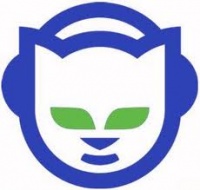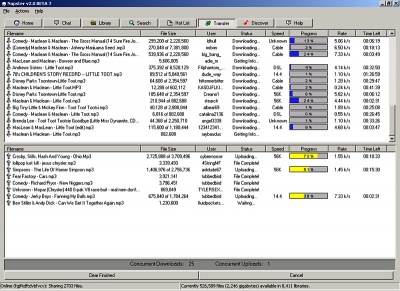Napster
Napster, was a free peer-to-peer file sharing sharing program created in 1999 by co-founders Sean Parker and Shawn Fanning. At its peak in the early 2000's there were over 20 million users, the majority being college students. Napster was the first file sharing software in which users could download music from other users, rather than from a central computer. Napster was the target of many copyright infringement lawsuits from artists, record labels, and others in the music industry. The legal controversy eventually led to the downfall of the P2P file sharing software which was court ordered to shut down immediately in 2001[1].
Contents
Early History
Napster was created by Shawn Fanning at the age of 18 in his dorm room at Northeastern University in Boston, MA. [2] Fanning was not happy with the current inconvenience of finding downloadable music online, and took it upon himself to improve the system. He wanted a program capable of sharing music with his friends, as a result Fanning stayed up for 60 hours coding the program. Fanning and his friend Sean Parker raised $50,000 in investments and launched a beta version of their software in June 1999. Over the next twelve months the program gained tens of millions of users worldwide and was considered one of the fastest growing web applications of its time.[3]
Ethical Issues
Due to its rapid growth in users, in 2001, members the of the Recording Industry Association of American took notice of the copyright infringement on the site. Many artists such as Metallica and Dr. Dre, through the RIAA, sued Fanning and his team for facilitating free trade of illicit music files, a direct violation of Copyright law.[4] It was estimated that over 2.79 billion songs were illegally transferred during Napster's peak month, February 2001. Napster argued that because the music files were never in their own possession, and rather transferred directly between users, that Napster had no legal responsibility. As court proceedings progressed, one point of debate was the criminality of Napster users.
Bertelsmann Acquisition and Shutdown
In 2001, a German media company, Bertelsmann, agreed to a partnership with Napster to transform it into a membership-based music catalog. Bertelsmann promised a membership-based distribution system that would pay money to artists. Amidst the new partnership, the lawsuit still continued on. In July 2001, the The 9th U.S. Circuit Court of Appeals issued an injunction for Napster to immediately shutdown in order to prevent the trading of copyrighted music on its network. In the last days usage of the software spike 71% as users tried to get as much music as possible before the shutdown was implemented.
Transformation to legal service
Over next decade Napster went through many acquisitions and changes as the software company attempted to reemerge with a legal form of Napster. Below is the series of acquisitions and key events:[5]
September 2001 - Napster settles its suits against the RIAA and agrees to pay $26 million in damage for all previously traded music and a downpayment of $10 million dollars for future royalties.
September 3, 2002 - Napster files for bankruptcy and is forced to liquidate all assets.
2003 - Napster was bought by Roxio, a software company that produces digital media products. Roxio acquired Napster through a bankruptcy auction and intended to relaunch the Napster as a digital retail music distributer, similar to iTunes
2008 - Best Buy, the consumer electronics superstore, agrees to pay $121 million to Roxio to compete with then rival Circuit City.
October 2011 - Best Buy no longer wanted apart of the crowded digital music industry and sold the Napster brand to Rhapsody. Rhapsody had no intentions to continue Napster, but purchased it specifically for its intellectual property and notoriety. Napster was absorbed into the Rhapsody brand and is currently operating under the Rhapsody name.[6]
See Also
- Bandcamp
- Digital Piracy
- File Sharing
- iTunes Store
- Kazaa
- Limewire
- Pandora
- Rhapsody
- Sampling (hip hop)

